人教版小学英语四大时态上课讲义
- 格式:doc
- 大小:19.50 KB
- 文档页数:4


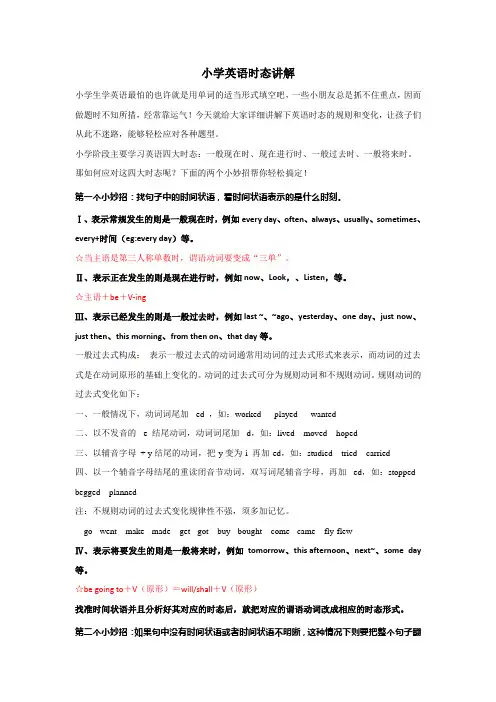
小学英语时态讲解小学生学英语最怕的也许就是用单词的适当形式填空吧,一些小朋友总是抓不住重点,因而做题时不知所措,经常靠运气!今天就给大家详细讲解下英语时态的规则和变化,让孩子们从此不迷路,能够轻松应对各种题型。
小学阶段主要学习英语四大时态:一般现在时、现在进行时、一般过去时、一般将来时。
那如何应对这四大时态呢?下面的两个小妙招帮你轻松搞定!第一个小妙招:找句子中的时间状语,看时间状语表示的是什么时刻。
Ⅰ、表示常规发生的则是一般现在时,例如every day、often、always、usually、sometimes、every+时间(eg:every day)等。
☆当主语是第三人称单数时,谓语动词要变成“三单”。
Ⅱ、表示正在发生的则是现在进行时,例如now、Look,、Listen,等。
☆主语+be+V-ingⅢ、表示已经发生的则是一般过去时,例如last~、~ago、yesterday、one day、just now、just then、this morning、from then on、that day等。
一般过去式构成:表示一般过去式的动词通常用动词的过去式形式来表示,而动词的过去式是在动词原形的基础上变化的。
动词的过去式可分为规则动词和不规则动词。
规则动词的过去式变化如下:一、一般情况下,动词词尾加-ed ,如:worked played wanted二、以不发音的-e 结尾动词,动词词尾加-d,如:lived moved hoped三、以辅音字母+ y结尾的动词,把-y变为-i 再加-ed,如:studied tried carried四、以一个辅音字母结尾的重读闭音节动词,双写词尾辅音字母,再加-ed,如:stopped begged planned注:不规则动词的过去式变化规律性不强,须多加记忆。
go - went make - made get - got buy - bought come - came fly-flewⅣ、表示将要发生的则是一般将来时,例如tomorrow、this afternoon、next~、some day 等。

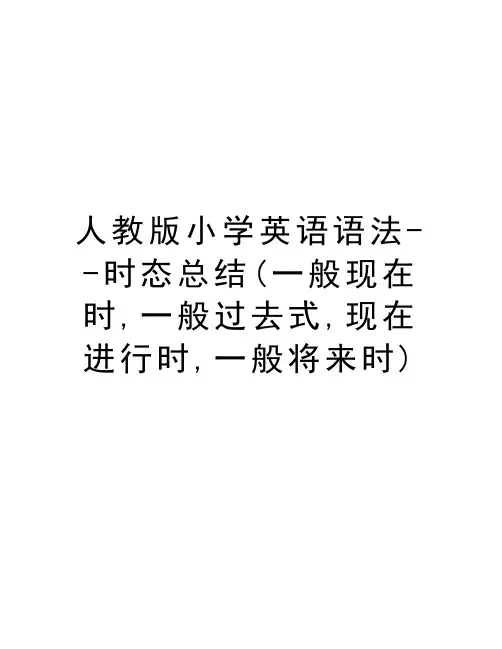
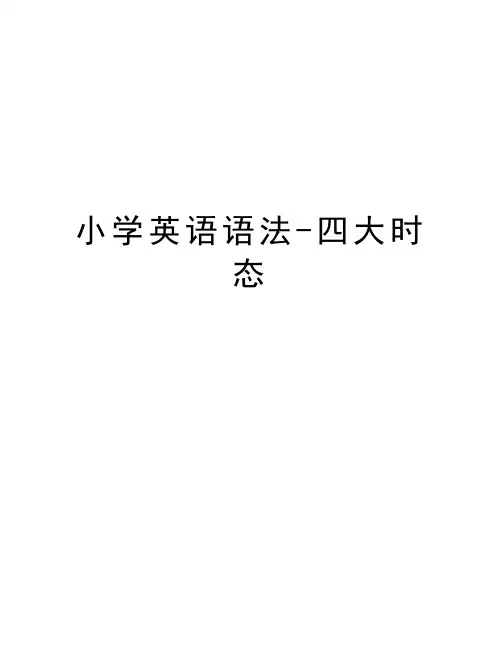
小学英语语法-四大时态四大时态复习1. 一般现在时(1)一般现在时的构成(肯定句)☆ be动词:主语+be(am,is,are)+其它。
如:I am a boy.我是一个男孩。
☆行为动词:主语+行为动词(+其它)。
如:We study English.我们学习英语。
☆当主语为第三人称单数(he, she,it)时,要在动词后加"-s"或"-es"。
如:Mary likes Chinese. 玛丽喜欢汉语。
(2)一般现在时的变化☆ . be动词的变化。
[否定句]:主语+ be + not +其它。
如:He is not a worker.他不是工人。
[一般疑问句]:Be +主语+其它。
如:-Are you a student? -Yes. I am. / No, I'm not.[特殊疑问句]:疑问词+一般疑问句。
如:Where is my bike?☆ .行为动词的变化。
[否定句]:主语+ don't( doesn't ) +动词原形(+其它)。
如:I don't like bread.当主语为第三人称单数时,要用doesn't构成否定句。
如:He doesn't often play.[一般疑问句]:Do( Does ) +主语+动词原形+其它。
如:- Do you often play football?- Yes, I do. / No, I don't.当主语为第三人称单数时,要用does构成一般疑问句。
如:- Does she go to work by bike? - Yes, she does. / No, she doesn't.[特殊疑问句]:疑问词+一般疑问句。
如:How does your father go to work?*动词+s的变化规则1.一般情况下,直接加-s,如:cook-cooks, milk-milks2.以s. x. sh. ch. o结尾,加-es,如:guess-guesses, wash-washes, watch-watches, go-goes 3.以“辅音字母+y”结尾,变y为i, 再加-es,如:study-studies2.现在进行时(1)一般现在时的构成: be(am,is, are)+ 动词的ing形式。
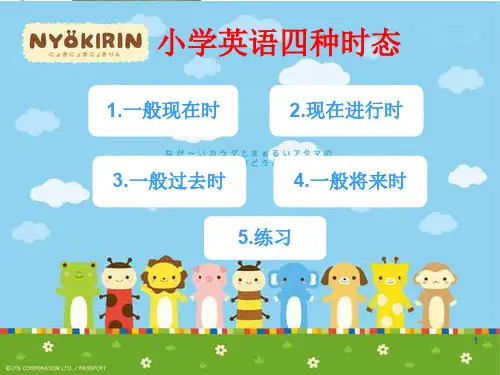
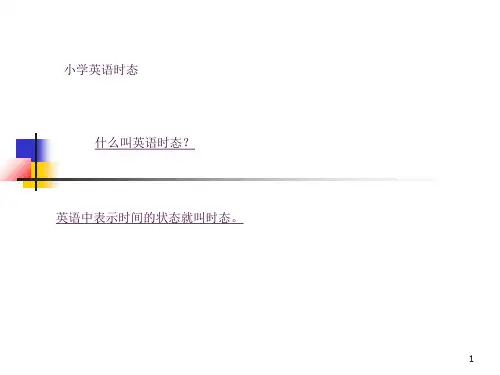
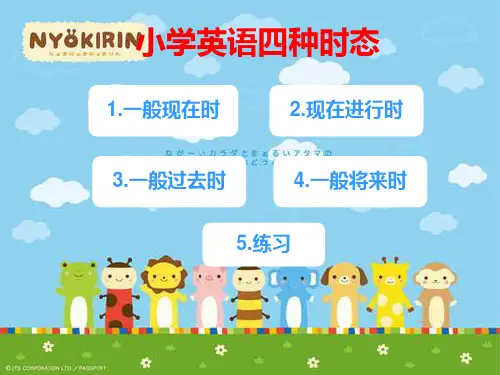
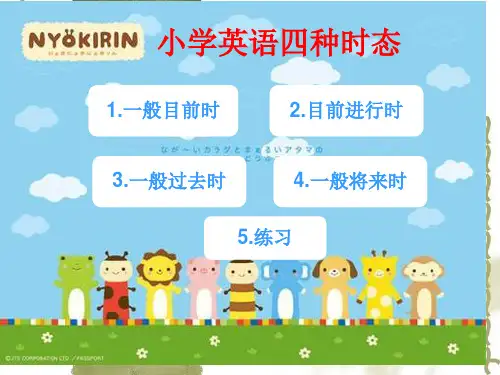

人教版小学英语四大时态人教版小学英语四大时态(一般现在时、一般过去时、一般将来时、现在进行时)练习题集锦一、用动词的正确形式填空1. I ________ (do) my homework every evening.2. We _______ (fly) kites in the park on Sundays.3. My mother ________ (clean) our room on Sundays.4. Tom _______(play) the piano every Saturday. Now he______ (play).5. She _______(like) swimming. She ______ (swim) this weekend.6. Usually my mother _______ (wash) the dishes after lunch. But my gra ndma_______ (wash) today.7. Look at the man! He ______ (read) a magazine.8. Look! The plane ________ (fly) over the building.9. Listen! My aunt ________ (sing) in the room.She is a singer. She _ ____ (like) singing. She _______(have) a music show. She is excited. 10. Tom and Mike always ______ (swim) in the river. They _____ (swim) in the swimming pool this Sunday. Look! They ______ (swim).11. What ______ you usually ______ (do) in the evening?I _______ (play) computer games.12. What _______ you _______ (do) now?I _______ (make) a paper plane.13. What _______ he _______ (do)?He ______ (dance).14. What _______ she ______ (do) yesterday?She ______ (visit) her grandparents.15. ______ your mother ______ (read) newspaper in the morning?Yes, She ________ .16. _______ you _______ (like) fishing?No, I ______ . I like ______ (swim),but my brother ______ (like).17. How ______ your father _______ (go) to work every day?He ______ (go) by bike. But it’s cold today. He ______ (take) t he No.21 bus,, and he _______ (go) to work by taxi yesterday.18. _______ the monkey _______ (like) climbing trees? Yes, it _______ .19. What _______ your father ______ (do) after lunch? He _______ (read)a comic book. What _____ he _______(do) today? He _______ (clean) the kitchen for my grandma. Look! He (clean).20. ________ you ______ (collect) stamps? Yes. I _______ .________ your brother ______ (collect), too? No, he ________ .二、选择题1. _____ he _____ to the park at 6:30 in the morning? No,he _____ .A. Does; goes; doesB. Does; go; doesn’tC. Does; go; does2. What colour _____ you _____ this bookcase? I _____ it pink.A. are; going to paint; am going to paintB. do; paint; paintC. did; paint; painted3. Tim always _____ a picture at home. He _____ a car now.A. draws; is drawingB. draw; drawC. draws; draw4. She usually _____ her friends. They often _____ tea.A. see; drinkB. sees; drinksC. sees; drink5. He usually _____ the dishes at night, but tonight he _____ clothes.A. wash; washB.washes; is going to washC. is washing; was hes6. Mr. Green usually _____ his newspaper in the evening, but he and h is wife _____ television yesterday evening.A.reads; watchesB.reads; is going to watchC.reads; watch ed7. Where are the man and the woman? They _____ near the tree.A. sitB. satC. are sitting8. _____ your penpal _____ diving? No, he _____ .He ______ writing sto ries.A. Does; like; doesn’t;likesB. Does; likes; doesn’t;likeC. Do; like; don’t;likes9. _____ you _____ fishing yesterday? No, we _____ .A. Does; go; doesn’tB. Did; go; didn’tC. Do; go; do n’t10. Open the window, Please. Look! He _____ it.A. opensB. is openningC. is opening11. I usually _____ some milk every day. But I _____ coffee yesterday.A. drink; drankB. is drinking; drinkC. drank; am drink ing12. Mr. Green often _____ his newspapers at night. But he _____ an in teresting book tonight.A. reads; readsB. reads; readC. reads; is going to read13. The old man _____ playing sports in the park. He _____ morning ex ercise now.A. likes; is doingB. likes; doesC. like; doin g14. What _____ you usually _____ in the evening? I ______ computer gam es.What _____ you _____ last night? I _____ a book.A. do; do; playB. did; do; playedC. does; do; p laysdid; do; read do; do; read do; do; am reading15. Where ______ the boy _____ ? He _____ across the river now.A. does; swim; swimsB. is; swimming; is swimmingD. is; swimming; is swimming16. _____ you _____ to music now? Yes, we _____ .A. Do; listen; doB. Did; listen; didC. Are; listening; are17. Put on you coat, please. OK. I ______ it on.A. am puttingB. am going to putC. put18. _____ you ______ coffee? Yes, I ______ .A. Do; like; doB. Did; like; didC. Are; like; am19. Look! Two cats ______ across the wall.A. runB. runsC. are runnin g20. She _____ tea, but he _____ .A. likes; doesn’t B; like; don’t C. like; doesn’t。